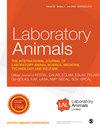巴西小鼠设施中的鼠星状病毒(MuAstV)感染:南美首份报告
IF 1.3
4区 农林科学
Q2 VETERINARY SCIENCES
引用次数: 0
摘要
本研究旨在调查巴西是否存在小鼠星状病毒(MuAstV)。研究人员收集了巴西四家动物饲养场的小鼠粪便样本,并使用实时聚合酶链反应对样本进行了MuAstV检测。在检测的 162 份样本中,38 份(23.5%)对 MuAstV 呈阳性,其中 33 份(91.7%)来自无特定病原体的群落。虽然大部分样本来自无症状动物,但有三只小鼠出现腹泻症状,而通过分子检测,MuAstV 是唯一检测到的病原体。系统发育分析表明,本研究中的 MuAstV 株系与美国的原型相似。在评估实验室啮齿动物健康监测计划时,必须考虑到 MuAstV 的高流行率、环境稳定性、遗传多样性和持续感染的可能性。本文章由计算机程序翻译,如有差异,请以英文原文为准。
Murine astrovirus (MuAstV) infection in mouse facilities in Brazil: First South American report
This study aimed to investigate the presence of murine astrovirus (MuAstV) in Brazil. Fecal samples from mice belonging to four Brazilian animal facilities were collected and tested for MuAstV using real-time polymerase chain reaction. Of the 162 samples tested, 38 (23.5%) were positive for MuAstV, 33 (91.7%) of which came from specific-pathogen free colonies. Although most of the samples were obtained from asymptomatic animals, three mice presented diarrheal symptoms, and MuAstV was the only agent detected by molecular assay. Phylogenetic analysis revealed similarities between the MuAstV strains from this study and prototypes from the USA. MuAstV’s high prevalence, environmental stability, genetic diversity and potential for persistent infections must be considered when evaluating health monitoring programs for laboratory rodents.
求助全文
通过发布文献求助,成功后即可免费获取论文全文。
去求助
来源期刊

Laboratory Animals
生物-动物学
CiteScore
4.90
自引率
8.30%
发文量
64
审稿时长
6-12 weeks
期刊介绍:
The international journal of laboratory animal science and welfare, Laboratory Animals publishes peer-reviewed original papers and reviews on all aspects of the use of animals in biomedical research. The journal promotes improvements in the welfare or well-being of the animals used, it particularly focuses on research that reduces the number of animals used or which replaces animal models with in vitro alternatives.
 求助内容:
求助内容: 应助结果提醒方式:
应助结果提醒方式:


